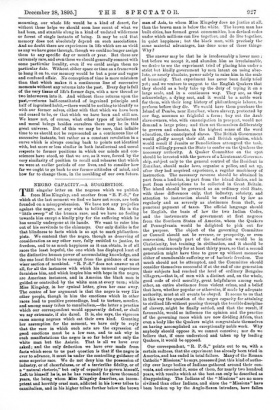NEGRO CAPACITY.—A SUGGESTION.
THE singular letter on the negroes which we publish from Miss Kingsley, and another from "R. P.-S.," for which at the last moment we find we have not room, are both founded on a misapprehension. We have not any prejudice against the negro, or any wish to belittle him. He is the 'little sweep" of the human race, and we have no feeling towards him except a kindly pity for the suffering which he has usually undergone at its hands. We want to raise him out of his servitude to the chimneys. Our only dislike is for that blindness to facts which is so apt to mark philanthro- pists. We contend that the negro, though as deserving of consideration as any other race, fully entitled to justice, to freedom, and to as much happiness as it can obtain, is of all races the least hopeful, the one which has displayed least of the distinctive human power of accumulating knowledge, and the one least fitted to be exempt from the guidance of some wiser section of mankind. "R. P.-S." does not answer us at all, for all the instances with which his unusual experience furnishes him, and which inspire him with hope in the negro, are American instances, and in America the black man is guided or controlled by the white man at every turn; while Miss Kingsley, in her cynical letter, gives her case away. The centre of her argument is that the negro is very like other people, though in him the emotions which in other races lead to punitive proceedings, lead to torture, murder, and among many tribes to cannibalism,—the latter a practice which our correspondent would apparently defend, or shall we say extenuate, if she dared. It is, she says, the vigorous races among negroes which eat their own kind. Granting her assumption for the moment, we have only to reply that the race in which such acts are the expression of good emotions must be a low race, and to ask why in such manifestations the negro is so far below not only the white man but the Asiatic. That is all we have ever asked; and the only deduction we have ever made from facts which seem to us past question is that if the negro is ever to advance, it must be under the controlling guidance of some superior race. We do not deny him the possession of industry, or of cheerfulness, or of a terrierlike fidelity, or of a " natural rhetoric," but only of capacity to govern himself. Left to himself he is, as he has remained for three thousand years, the being whom Miss Kingsley describes, an incom- petent and horribly cruel man, addicted in his lower tribes to cannibalism, and in his higher tribes further below the brown
man of Asia, to whom Miss Kingsley does no justice at all, than the brown man is below the white. The brown man has built cities, has formed great communities, has devised codes under which millions can live together, and do live together, in quiet happiness ; but the black man, with precisely the same material advantages, has done none of these things. Why ?
The answer may be that he is irredeemably a lower man ; but before we accept it, and abandon him as irreclaimable, we desire to see the experiment tried of placing him under a strict but kindly government by men intent on using abso- lute, or nearly absolute, power solely to raise him in the scale of humanity. That experiment has never been fairly tried yet ; and we venture to suggest to the English Quakers that they should as a body take up the duty of trying it on a large scale, and in a continuous way. They are, as they acknowledge, a dying sect, and it would be a noble work for them, with their long history of philanthropic labour, to perform before they die. We would have them purchase the Island of Pemba, near Zanzibar, where slavery, protected by our flag, assumes so frightful a form ; buy out the Arab slave-owners, who, with emancipation in prospect, would not demand a large price; and then set themselves deliberately to govern and educate, in the highest sense of the word education, the emancipated slaves. The British Government would gladly accept their aid, and British opinion, which would recoil if Jesuits or Benedictines attempted the task, would willingly permit the State to confer on the Quakers the necessary authority. A Quaker Committee on the spot should be invested with the powers of a Lieutenant-Governor- ship, subject only to the general control of the Resident in Zanzibar, should make laws, organise a police, and set up, after they had acquired experience, a regular machinery of instruction. The necessary revenue should be obtained in part from a land.tax, in part from the island duties, and in part from subscriptions to be collected in Great Britain. The island should be governed as an ordinary civil State, with these differences only, that industry, sobriety, and attention to instruction should be enforced by law as regularly and as severely as abstinence from theft, or punctual payment of taxes. The official language should be English, the basis of law the two Indian Codes, and the instruments of government at first negroes from the Southern States of America, whom the Quakers of Pennsylvania would be delighted to pick out for the purpose. The object of the governing Committee or Council should not be revenue, or prosperity, or even conversion, though part of the education would be in Christianity, but training in civilisation, and it should be sought continuously for at least thirty years, so that a second generation might have time to grow up without memories either of unendurable suffering or of barbaric freedom. Too much should not be attempted, and the Committee should consider themselves successful if at the end of one generation their subjects had reached the level of ordinary Bengalee villagers,—that is, of men with a distinct and, on the whole, good code of civil morality, great helpfulness among each other, an entire abstinence from violent crime, and a belief that laws, whether popular or otherwise, if made by adequate authority, must at all events be obeyed. It seems to us that in this way the question of the negro capacity for attaining to civilised life without passing through the terrible discipline of slavery, might be finally settled, and that the result, if favourable, would so influence the opinion and the practice of the governing races which are now dividing Africa, that even a body like the Quakers might congratulate themselves on having accomplished an exceptionally noble work. Why anybody should oppose it, we cannot conceive ; nor do we believe that, if once understood and taken up by leading Quakers, it would be opposed.
Our correspondent, "R. P.-S.," points out to us, with a certain sadness, that the experiment has already been tried in America, and has ended in total failure. Many of the Roman Catholic" Missions," he says, possessed just this kind of autho- rity over large bodies of Indians gathered around their con- vents, and exercised it, some of them, for nearly two hundred years, with results which at the best can only be described as disappointing. The Indians of the "Missions" are no more civilised than other Indians, and since the "Missions" have been broken up by the Anglo-Saxon intruders, have fallen back for the most part into comparative savagery. Although the history of these "Missions" is exceedingly little known in Protestant communities, and although Spanish priests pro. bably differed widely from English Quakers, this observation contains, we fear, a melancholy truth. There are hope- less races as there are hopeless men. It is perfectly possible that the experiment we suggest might fail, and might leave behind it, as the history of the "Spanish Missions" has left among thoughtful Americans, an impression that there are races which lack, and will always lack, some mental power essential to enable its possessors to bear the burden of civilisation. We believe that the most devoted missionaries do not doubt that there is some such want among Australian aborigines, which baffles or defeats their own most strenuous efforts. It may possibly be that in the purpose of the Creator, the negro is destined for some other end than to swell the ranks of civilised mankind, and that he will remain for ever essentially a barbarian. But it is clear that the absence of improvement in the Indian is no proof that the negro cannot be improved ; and we submit that the little evidence we have tends in the other direction. He cannot, if left alone, improve himself,—that seems clear; but among white men he often rises to a high level of intelligence, and, moreover, displays qualities —especially a capacity for reverence, for affection, and for guiding his life by the dictates of a creed—equal to any which the white man possesses. The question is complicated by the fact that the slaves of the Southern States came originally from at least four widely different tribes, who may have had widely:different capacities ; but it seems fair to say that if a race can produce individuals of high attainments, as the negro race in America has certainly done, its average man cannot be devoid of the rudimentary powers from which, when developed, those attainments spring. We do not, we need not say, agree with Miss Kingsley in believing that the evil practices of negroes are but developments in another way of the defensive habits adopted by civilised men ; but we do believe that it is possible, under the absolute but kindly rule of white men, to give negroes a dead heave up- wards, and, at all events, to develop in them the civic virtues which no historian can doubt have developed themselves in Asia. The mistake made in the Liberian experiment was in believing that the negro needed no guidance from above.



































 Previous page
Previous page